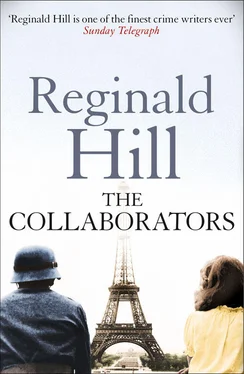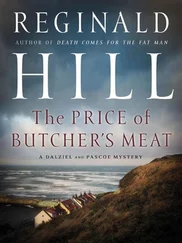‘That will be the purpose of your trial,’ said the official, retrieving the hat. ‘Now, if you please, madame.’
’Madame, is it? What a lot of changes! A hat, and madame. What’s wrong with Kraut-cunt? Or Bitch-face? Or Whore? Oh, Jesus Christ!’
She screamed as the wardress twisted her arms behind her and locked them together with handcuffs so tight that they crushed the delicate wrist-bones beneath the emaciated flesh.
‘You’ll hear worse than that before the trial’s over, dearie, never you fret,’ said the wardress, ramming the hat down over her brow with brutal force. ‘Now, on your feet and follow the nice man, though it’s a waste of time and money, if you ask me. Straight out and shot, that was the best way for your kind. I don’t know how they missed you.’
‘Keep your mouth shut, woman,’ ordered the court officer. ‘You’re a Government employee. Show some respect for the law.’
The wardress glared resentfully at his back as she urged Janine after him.
‘Jumped up fart-in-a-bottle,’ she muttered.
She got her revenge twenty minutes later as they paused outside the courtroom. Suddenly Janine lunged her head at the jamb. She gave her skull a sickening crack but she dislodged the hat. The official stooped to pick it up, but before he could retrieve it, the wardress had pushed Janine through the doorway.
On the crowded public benches, the ripple of expectancy surged momentarily into a chorus of abuse then almost instantly faded into an uneasy silence.
They had been expecting to see a woman they could hate. Instead they found themselves looking at a creature from another world, whose pale, set face, eroded to the bone line by hunger and cold, was completely dehumanized by the high, narrow dome of the shaven skull. In the six months since that first punitive shaving, her head had been razored three times more as an anti-vermin measure. Now the shadows of regrowing hair, and the scars and sores where the razor had been wielded with deliberate or accidental savagery, gave her skull the look of a dead planet. Even the jury, selected for their unblemished Resistance records, looked uneasy. There were only four of them. The new Courts of Justice were desperately overworked and personnel had to be spread thin. Janine, indifferent to change or reaction, fixed her gaze on the single presiding judge and cried, ‘Please, Your Honour, I don’t care what you do to me, but if you have any news of my children, please tell me. Surely I’ve a right to know, a mother’s right.’
For a moment the plea touched almost every heart, but at the same time it made her human again and therefore vulnerable, and they had come to wound.
‘Probably the little bastards’ve gone back to Berlin with their dad!’ a voice called out.
Eager for release from their distracting sympathy, the majority of those present burst into laughter. But this died away as a man on the benches reserved for witnesses leapt to his feet and cried angrily, ‘You’re wrong! Take that back! The father of this whore’s children was a hero and a patriot. Don’t slander him or his children. He couldn’t help his wife and they can’t help their mother.’
Again the courtroom was reduced to silence under the contemptuous gaze of the speaker, a man of about thirty with prematurely greying hair and a face almost as pale and intense as the prisoner’s. He leaned heavily on a stick, and on the breast of his smart black business suit he wore the ribbons of the Médaille de la Résistance and the Croix de l’Ordre de la Libération.
This time the judge, a grey-faced, tired man of perhaps fifty, broke the silence.
‘Monsieur Valois,’ he said. ‘We are delighted to see you restored to health and honoured to have you in court, particularly as your testimony is, I understand, essential to the prosecution of the case.’
Now his tone changed from polite respect to quiet vehemence.
‘However, you must remember that during the course of this trial you are as much subject to the discipline of our country’s laws as the prisoner herself. Therefore I would respectfully ask that you offer your testimony in due order and form.’
Christian Valois subsided slowly and the judge let his weary gaze move unblinkingly over the public benches. He had lost count of how many of these cases he had had to deal with since the Courts of Justice had finally creaked into operation here in Paris last October. He knew there was work enough to keep him busy for months, perhaps years to come. Well, it was necessary; justice required that those who had betrayed their country’s trust should be brought to account, and the people demanded it. But it was well for the people to know too that the days when the Resistance wrote its own laws were past, and the judiciary was back in control.
Satisfied that his point was made he said, ‘Now let us proceed.’
There was some legal preamble, but finally, in an intense silence, the charges were read.
‘Janine Simonian, born Crozier, you are accused that between a date unknown in 1940 and the liberation of Paris in August 1944 you gave aid and comfort to the illegal occupying forces of the German Army; that during the whole or part of this same period you acted as a paid informant of the secret intelligence agencies of the said forces; that you provided the enemies of your country with information likely to assist them in defeating operations and arresting members of the FFI; and more specifically, that you revealed to Hauptmann Mai, counter-intelligence officer of the German Abwehr, details of a meeting held in June 1944, and that as a result of this betrayal the meeting was raided, several resistants were captured and subsequently imprisoned, tortured and deported, and your own husband, Jean-Paul Simonian, was brutally murdered.’
The official reading the charges paused and the spectators filled the pause with a great howl of hatred. Janine heard all the abuse the wardress had promised.
She looked slowly round the room as if searching for someone, her gaze slipping as easily over the anxious faces of her parents as all the rest.
‘Janine Simonian, you must plead to these charges. How do you plead? Guilty or not guilty?’
She sighed deeply, seemed to shrug her thin shoulders and spoke inaudibly.
‘The court must be able to hear the prisoner’s plea.’
Again that shrug as if all this was irrelevant.
But now her eyes had found a face to fix on, the pale, drawn features of the man called Christian Valois, and she raised her voice just sufficiently to be heard.
‘Guilty,’ she said wearily. ‘I plead guilty.’
Ils ne passeront pas!
Marshal Henri Philippe Pétain,
Verdun 1916
The poplar-lined road ran arrow-straight from north to south.
At dawn it was empty. The rising sun barred its white surface with the poplars’ shadows so that it lay like an eloper’s ladder against the ripening walls of corn.
Now a car passed down it fast.
A few minutes later there was another.
Both cars had their roof-racks piled high with luggage.
The sun climbed higher, grew hotter. By ten there was a steady stream of south-bound traffic. By eleven it had slowed to a crawl. And it no longer consisted solely of cars.
There were trucks, vans, buses, taxis; horse-drawn carts and pony-drawn traps; people on foot pushing handcarts, barrows, prams and trolleys; men, women and children and babes in arms; rich and poor, old and young, soldiers in blue, priests in black, ladies in high heels, peasants in sabots; and animals too, dogs and cats and smaller pets nursed by loving owners, cows, geese, goats and hens driven by fearful farmers; here in truth was God’s plenty.
Читать дальше












